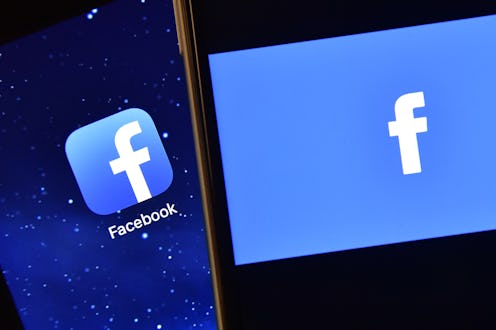In an age where the meaning of "privacy" is constantly evolving, it can still catch you off-guard to hear that a new social media app has minimal or no privacy settings — but that's exactly what's going on with Facebook Lifestage. If you're wondering what Facebook Lifestage is and why you haven't heard of it, there's a very logical reason: you're too old. Like, literally, via the rules of the app.
In a move meant to appeal to high schoolers and young teens, Facebook has launched an app for teens 13 and up that bars anyone over the age of 21 from viewing content. Says a Facebook spokesperson to Bustle via email, “We're testing Lifestage, a new standalone app from Facebook. Built for teens who want to connect with others at their school, Lifestage allows them to create a video profile with content for all of things that make up their identity— things like what they like and don't like, their best friend, and more. Lifestage is currently in the App Store, but only becomes fully unlocked once a certain number of people at a school join the app.”
Lifestage, which went live on Friday, was created by 19-year-old Michael Sayman, a former Facebook intern who wants to recapture Facebook's roots and reclaim its former identity. "Back in 2004, Facebook was all about 'who I am.' I could post my relationship status. I could share what my favorite music was. And it was all about expressing myself," wrote Sayman in a recent Facebook post introducing Lifestage. "Today as Facebook has grown into so much more, we see the opportunity to explore that concept of 'who I am' once again, but for Generation Z in 2016."
It's true that Facebook has fallen off the radar of younger digital natives; according to Statista, just eight percent of the network's users are between the ages of 13 and 19. I can speak from experience here, too: Last summer, my 10- to 12-year-old students considered Facebook to be for "old people." They were much more interested in Instagram and Snapchat, simpler, image-based platforms with more immediate gratification.
That's what Lifestage is meant to be. Facebook itself is in the process of creating ways to connect that involve more visual content for which Facebook is traditionally known, and Lifestage is one of those tests. It brands itself as a "video yearbook," which would definitely have been appealing to me when I was 16, even it isn't so much now. (I know. I'm too spoiled by photo editing apps. I'm vain garbage.) As Sayman wrote in his Facebook post, "Lifestage allows people to build a profile made up entirely of 'video fields.' It allows them show others who they are and to find out more about the people in their school community as well as meet new people."
Lifestage also appears to want to drive home the reality of posting things on the internet to its young users. The above warning greets every new user, and a revolving header of messages reminds students there's no way to limit audience on the app, that people from other schools can "find" your profile, and that the app "can't promise that anyone in a school actually goes to that school." Since the app has no privacy settings, these warnings are particularly important.
Interestingly, though, I was immediately able to get into the app. It asks for your age, and then once you've registered, it asks for your school; but although I haven't been a student at my former high school since 2009, I was still able to create an account by giving it that school's name.
The final stage of registration asks students to enter their name, and any other social media handles — filed under "how to reach me." You can't move forward until you've submitted your information from at least one additional social platform.
A Facebook spokesperson addressed the privacy concerns about Lifestage in a statement provided to Bustle. "We are releasing Lifestage to a limited number of high schools. Lifestage will not provide access to content from other people for users who list an age above 21," says the statement. "We encourage anyone using the app who experiences or witnesses any concerning activity to report it to us through the reporting options built into the app. We take these reports seriously. Unlike other places on the web, Lifestage is tied to a person's phone number and only one account is allowed per phone number – this provides an additional level of protection and enforcement.”
Whether or not Lifestage will catch on remains to be seen; the fact that there aren't any privacy settings may make it much simpler than Facebook is now, but I can't help but feel that privacy settings are kind of important. Has Generation Z somehow evolved past the need for digital privacy? Or have they just learned the game of self-editing your online presence? Only time will tell.
This post has been updated with statements from Facebook about Lifestage.
Images: Maddy Foley/Bustle (2)
